新版外研初中英语 主将从现详细讲解与练习(精品)
- 格式:docx
- 大小:27.52 KB
- 文档页数:4
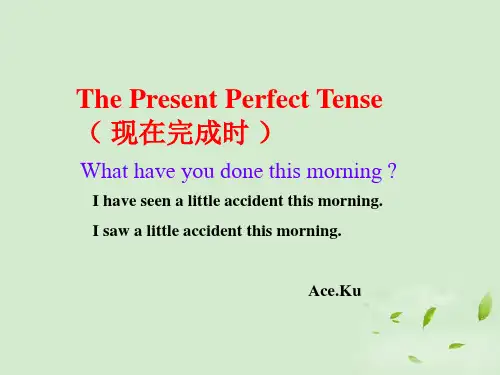
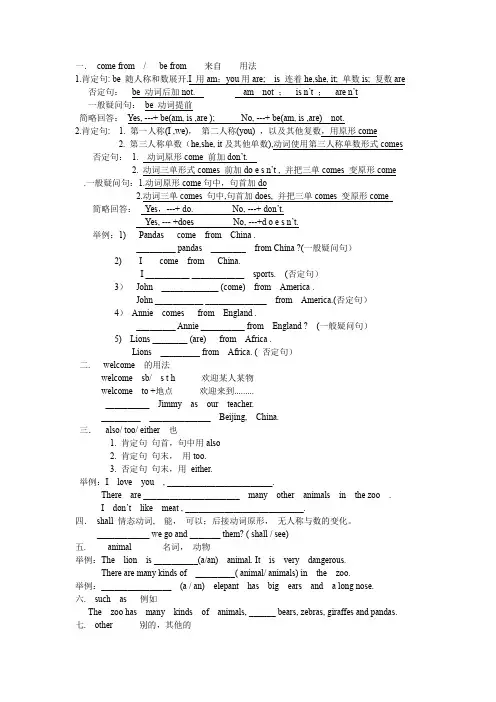
一.come from / be from 来自用法1.肯定句: be 随人称和数展开.I 用am;you用are; is 连着he,she, it; 单数is; 复数are否定句:be 动词后加not. am not ;is n’t ;are n’t一般疑问句:be 动词提前简略回答:Yes, ---+ be(am, is ,are ); No, ---+ be(am, is ,are) not.2.肯定句: 1. 第一人称(I ,we),第二人称(you) ,以及其他复数,用原形come2. 第三人称单数(he,she, it及其他单数),动词使用第三人称单数形式comes否定句:1. 动词原形come 前加don’t.2. 动词三单形式comes 前加do e s n’t , 并把三单comes 变原形come .一般疑问句:1.动词原形come句中,句首加do2.动词三单comes 句中,句首加does, 并把三单comes 变原形come简略回答:Yes,---+ do. No, ---+ don’t.Yes, --- +does No, ---+d o e s n’t.举例:1) Pandas come from China ._________ pandas ________ from China ?(一般疑问句)2) I come from China.I __________ ____________ sports. (否定句)3)John _____________ (come) from America .John ___________ ______________ from America.(否定句)4)Annie comes from England ._________ Annie __________ from England ? (一般疑问句)5) Lions ________ (are) from Africa .Lions _________ from Africa. ( 否定句)二. welcome 的用法welcome sb/ s t h 欢迎某人某物welcome to +地点欢迎来到.........__________ Jimmy as our teacher._________ ______________ Beijing, China.三.also/ too/ either 也1. 肯定句句首,句中用also2. 肯定句句末,用too.3. 否定句句末,用either.举例:I love you , ________________________.There are ______________________ many other animals in the zoo .I don’t like meat , ___________________________.四.shall 情态动词, 能,可以;后接动词原形,无人称与数的变化。
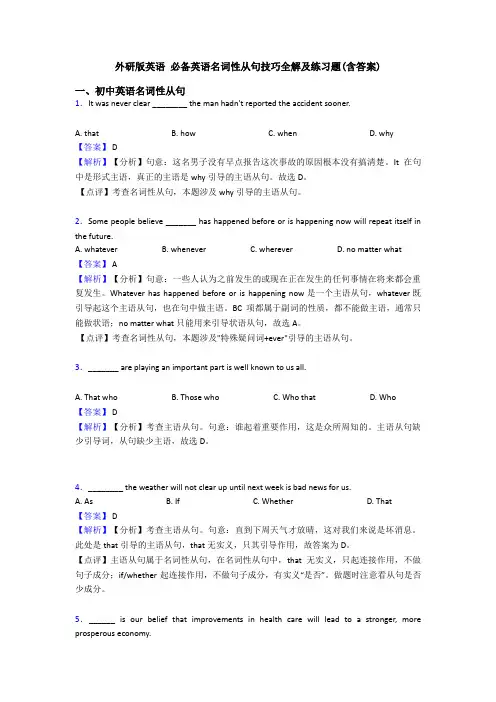
外研版英语必备英语名词性从句技巧全解及练习题(含答案)一、初中英语名词性从句1.It was never clear ________ the man hadn't reported the accident sooner.A. thatB. howC. whenD. why【答案】 D【解析】【分析】句意:这名男子没有早点报告这次事故的原因根本没有搞清楚。
It在句中是形式主语,真正的主语是why引导的主语从句。
故选D。
【点评】考查名词性从句,本题涉及why引导的主语从句。
2.Some people believe _______ has happened before or is happening now will repeat itself in the future.A. whateverB. wheneverC. whereverD. no matter what【答案】 A【解析】【分析】句意:一些人认为之前发生的或现在正在发生的任何事情在将来都会重复发生。
Whatever has happened before or is happening now是一个主语从句,whatever既引导起这个主语从句,也在句中做主语。
BC项都属于副词的性质,都不能做主语,通常只能做状语;no matter what只能用来引导状语从句,故选A。
【点评】考查名词性从句,本题涉及"特殊疑问词+ever"引导的主语从句。
3._______ are playing an important part is well known to us all.A. That whoB. Those whoC. Who thatD. Who【答案】 D【解析】【分析】考查主语从句。
句意:谁起着重要作用,这是众所周知的。
主语从句缺少引导词,从句缺少主语,故选D。
4.________ the weather will not clear up until next week is bad news for us.A. AsB. IfC. WhetherD. That【答案】 D【解析】【分析】考查主语从句。
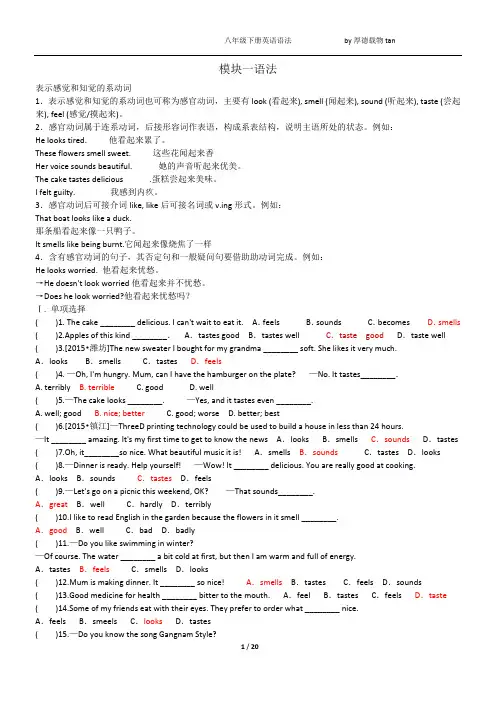
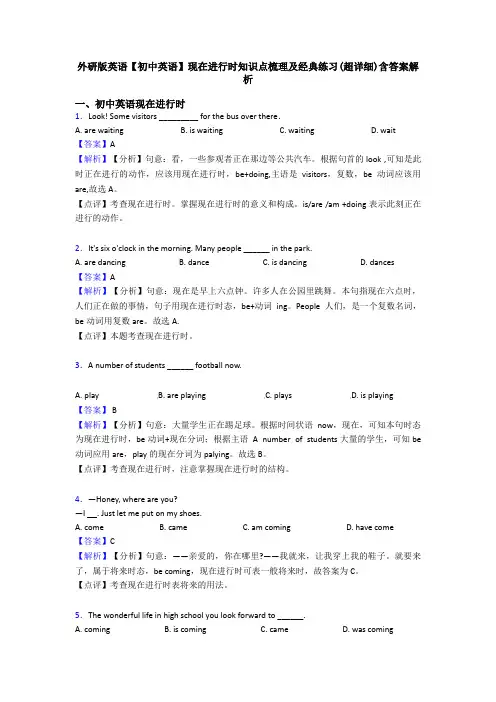
外研版英语【初中英语】现在进行时知识点梳理及经典练习(超详细)含答案解析一、初中英语现在进行时1.Look! Some visitors _________ for the bus over there.A. are waitingB. is waitingC. waitingD. wait【答案】A【解析】【分析】句意:看,一些参观者正在那边等公共汽车。
根据句首的look ,可知是此时正在进行的动作,应该用现在进行时,be+doing,主语是visitors,复数,be 动词应该用are,故选A。
【点评】考查现在进行时。
掌握现在进行时的意义和构成。
is/are /am +doing 表示此刻正在进行的动作。
2.It's six o'clock in the morning. Many people ______ in the park.A. are dancingB. danceC. is dancingD. dances【答案】A【解析】【分析】句意:现在是早上六点钟。
许多人在公园里跳舞。
本句指现在六点时,人们正在做的事情,句子用现在进行时态,be+动词ing。
People人们,是一个复数名词,be动词用复数are。
故选A.【点评】本题考查现在进行时。
3.A number of students ______ football now.A. playB. are playingC. playsD. is playing【答案】 B【解析】【分析】句意:大量学生正在踢足球。
根据时间状语now,现在,可知本句时态为现在进行时,be动词+现在分词;根据主语 A number of students大量的学生,可知be 动词应用are,play的现在分词为palying。
故选B。
【点评】考查现在进行时,注意掌握现在进行时的结构。
4.—Honey, where are you?—I . Just let me put on my shoes.A. comeB. cameC. am comingD. have come【答案】C【解析】【分析】句意:——亲爱的,你在哪里?——我就来,让我穿上我的鞋子。
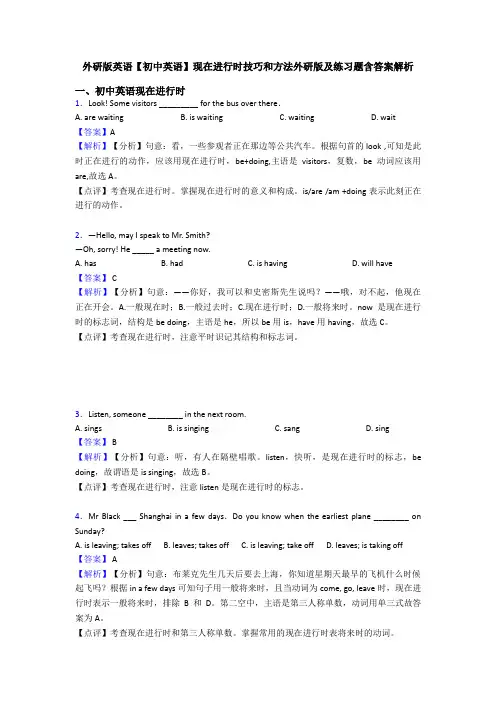
外研版英语【初中英语】现在进行时技巧和方法外研版及练习题含答案解析一、初中英语现在进行时1.Look! Some visitors _________ for the bus over there.A. are waitingB. is waitingC. waitingD. wait【答案】A【解析】【分析】句意:看,一些参观者正在那边等公共汽车。
根据句首的look ,可知是此时正在进行的动作,应该用现在进行时,be+doing,主语是visitors,复数,be 动词应该用are,故选A。
【点评】考查现在进行时。
掌握现在进行时的意义和构成。
is/are /am +doing 表示此刻正在进行的动作。
2.—Hello, may I speak to Mr. Smith?—Oh, sorry! He _____ a meeting now.A. hasB. hadC. is havingD. will have【答案】 C【解析】【分析】句意:——你好,我可以和史密斯先生说吗?——哦,对不起,他现在正在开会。
A.一般现在时;B.一般过去时;C.现在进行时;D.一般将来时。
now是现在进行时的标志词,结构是be doing,主语是he,所以be用is,have用having,故选C。
【点评】考查现在进行时,注意平时识记其结构和标志词。
3.Listen, someone ________ in the next room.A. singsB. is singingC. sangD. sing【答案】 B【解析】【分析】句意:听,有人在隔壁唱歌。
listen,快听,是现在进行时的标志,be doing,故谓语是is singing,故选B。
【点评】考查现在进行时,注意listen是现在进行时的标志。
4.Mr Black ___ Shanghai in a few days.Do you know when the earliest plane ________ on Sunday?A. is leaving; takes offB. leaves; takes offC. is leaving; take offD. leaves; is taking off【答案】 A【解析】【分析】句意:布莱克先生几天后要去上海,你知道星期天最早的飞机什么时候起飞吗?根据in a few days可知句子用一般将来时,且当动词为come, go, leave时,现在进行时表示一般将来时,排除B和D。
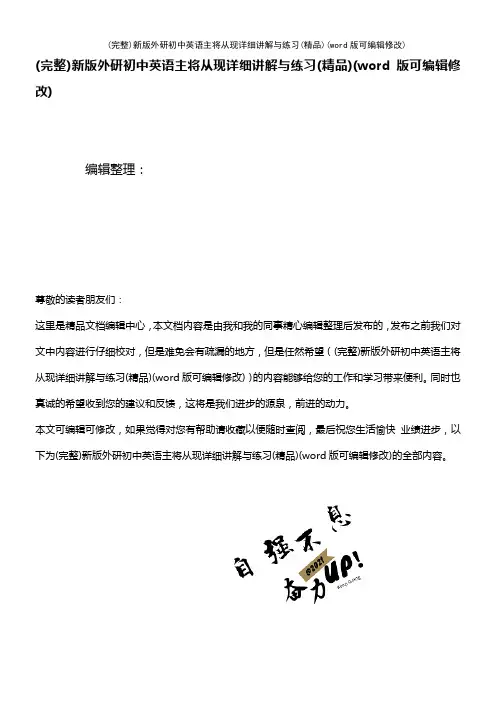
(完整)新版外研初中英语主将从现详细讲解与练习(精品)(word版可编辑修改)编辑整理:尊敬的读者朋友们:这里是精品文档编辑中心,本文档内容是由我和我的同事精心编辑整理后发布的,发布之前我们对文中内容进行仔细校对,但是难免会有疏漏的地方,但是任然希望((完整)新版外研初中英语主将从现详细讲解与练习(精品)(word版可编辑修改))的内容能够给您的工作和学习带来便利。
同时也真诚的希望收到您的建议和反馈,这将是我们进步的源泉,前进的动力。
本文可编辑可修改,如果觉得对您有帮助请收藏以便随时查阅,最后祝您生活愉快业绩进步,以下为(完整)新版外研初中英语主将从现详细讲解与练习(精品)(word版可编辑修改)的全部内容。
主将从现定义:主将从现是指在时间状语从句和条件状语从句中,如果主句是一般将来时,从句用一般现在时替代一般将来时.引导条件状语从句的词if :If you ask him, he will help you。
unless :I’ll go there tomorrow unless it rains.引导时间状语从句的词when , while , before , after , untill , till , since , as soon as ,1.主将从现主句是一般将来时,从句用一般现在时。
When I grow up,I’ll be a doctor。
If you go to the party, you will be happy.●2。
主祈从现主句是祈使句,从句用一般现在时。
Don’t laugh at me when I make a mistake。
Put it in your diary before you forget。
用记事本记下免得忘了.●3。
主情从现主句中含有情态动词,从句用一般现在时。
You should be quiet when you are in the reading room.A baby deer can stand as soon as it’s born. 小鹿一生下来就能站着。
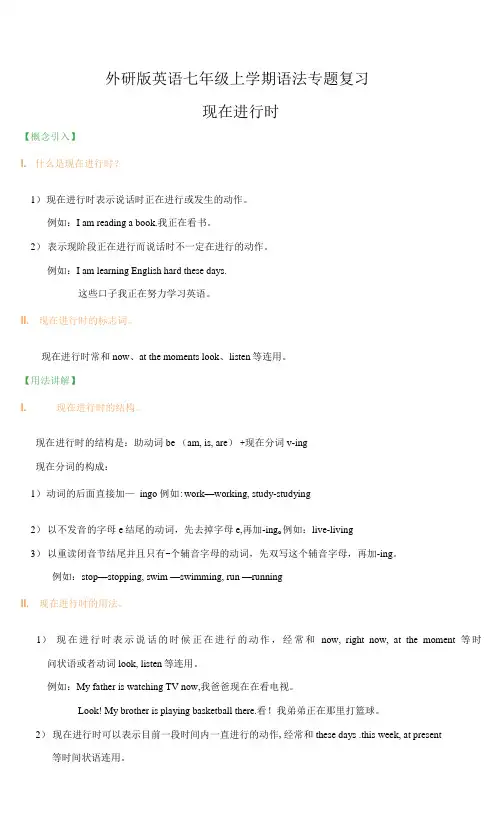
外研版英语七年级上学期语法专题复习现在进行时【概念引入】I. 什么是现在进行时?1)现在进行时表示说话时正在进行或发生的动作。
例如:I am reading a book.我正在看书。
2)表示现阶段正在进行而说话时不一定在进行的动作。
例如:I am learning English hard these days.这些口子我正在努力学习英语。
II. 现在进行时的标志词。
现在进行时常和now、at the moments look、listen等连用。
【用法讲解】I. 现在进行时的结构。
现在进行时的结构是:助动词be (am, is, are)+现在分词v-ing现在分词的构成:1)动词的后面直接加—ingo 例如:work—working, study-studying2)以不发音的字母e结尾的动词,先去掉字母e,再加-ing o例如:live-living3)以重读闭音节结尾并且只有-个辅音字母的动词,先双写这个辅音字母,再加-ing。
例如:stop—stopping, swim —swimming, run —runningII. 现在进行时的用法。
1)现在进行时表示说话的时候正在进行的动作,经常和now, right now, at the moment等时问状语或者动词look, listen等连用。
例如:My father is watching TV now,我爸爸现在在看电视。
Look! My brother is playing basketball there.看!我弟弟正在那里打篮球。
2)现在进行时可以表示目前一段时间内一直进行的动作,经常和these days .this week, at present 等时间状语连用。
例如:My parents are working on a farm these days.这些天我的父母在农场干活。
3)现在进行时还可以表示现在不断发展变化的小•情,表示不断发展变化的动词有get, grow,式。
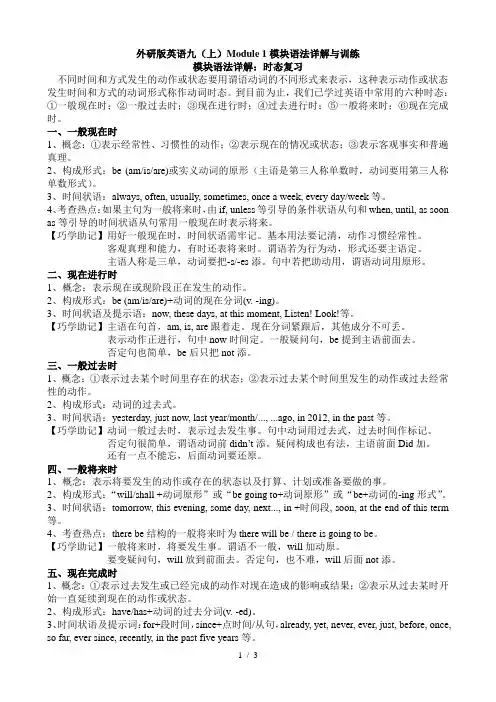
外研版英语九(上)Module 1模块语法详解与训练模块语法详解:时态复习不同时间和方式发生的动作或状态要用谓语动词的不同形式来表示,这种表示动作或状态发生时间和方式的动词形式称作动词时态。
到目前为止,我们已学过英语中常用的六种时态:①一般现在时;②一般过去时;③现在进行时;④过去进行时;⑤一般将来时;⑥现在完成时。
一、一般现在时1、概念:①表示经常性、习惯性的动作;②表示现在的情况或状态;③表示客观事实和普遍真理。
2、构成形式:be (am/is/are)或实义动词的原形(主语是第三人称单数时,动词要用第三人称单数形式)。
3、时间状语:always, often, usually, sometimes, once a week, every day/week等。
4、考查热点:如果主句为一般将来时,由if, unless等引导的条件状语从句和when, until, as soon as等引导的时间状语从句常用一般现在时表示将来。
【巧学助记】用好一般现在时,时间状语需牢记。
基本用法要记清,动作习惯经常性。
客观真理和能力,有时还表将来时。
谓语若为行为动,形式还要主语定。
主语人称是三单,动词要把-s/-es添。
句中若把助动用,谓语动词用原形。
二、现在进行时1、概念:表示现在或现阶段正在发生的动作。
2、构成形式:be (am/is/are)+动词的现在分词(v. -ing)。
3、时间状语及提示语:now, these days, at this moment, Listen! Look!等。
【巧学助记】主语在句首,am, is, are跟着走。
现在分词紧跟后,其他成分不可丢。
表示动作正进行,句中now时间定。
一般疑问句,be提到主语前面去。
否定句也简单,be后只把not添。
三、一般过去时1、概念:①表示过去某个时间里存在的状态;②表示过去某个时间里发生的动作或过去经常性的动作。
2、构成形式:动词的过去式。

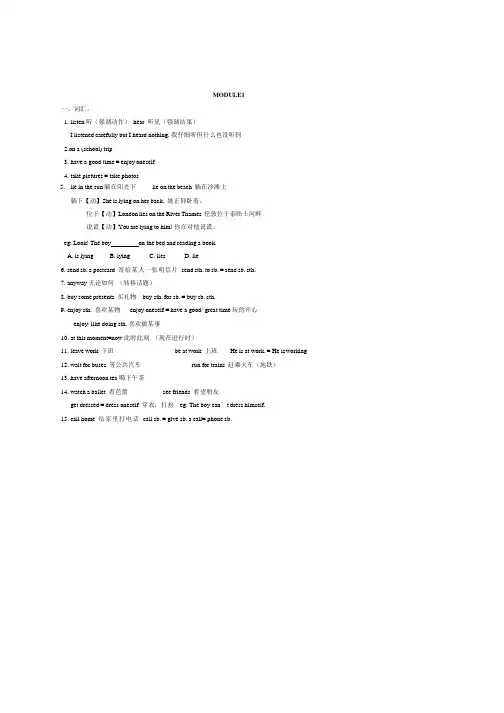
Module 10知识讲解与练习1. listen to the radio 听收音机2. Teachers' Day 教师节 Women's Day 妇女节 Labour Day 劳动节 Children's Day 儿童节 New Year's Day 元旦 Mother's Day 母亲节 Father's Day 父亲节 Mid - Autumn Day 中秋节 eg: 1) (妇女节)is on March 8th .2) ____________ (母亲节)is in May.3) Labour Day is in May/对划线提问) _____________ is Labour Day?4) __ Teachers , Day, Miss Li often gets many cards from her students ・D./ February March April May September October November 晚上及月份、年、季节、世纪、人 生的某个时期等。
eg: in the morning; in July; in 1993; in spring 表示在星期儿、具体的某一天及某一天的上午、下午、晚上等用on.eg: on May 2nd ; on Friday; on a rainy night; on Children's Day Ex:将下列短语译成英语1) ________________ .在冬天 ____________________ 2).在2008年__________________3).在一个温暖的上午 ____________________ 4).在8月8日5) Mary is flying to France soon. She will arrive in Paris ________ the morning of July 9th . A. in B. on C. at D. about4. marry sb = be/ get married to sb 和某人结婚marry sb to sb 把某人嫁给某人eg: 1)屜与一个医生结了婚。
一、名词单复数可数名词的复数——1.一般情况下 + sbook-books; bird-birds2.以辅音字母+y 结尾, 变y 为 i ,再加esstory-stories; party-parties3.以s, sh, ch ,x 结尾的单词 + esbus-buses; dish-dishes; watch-watches; box-boxes4.以辅音字母+o 结尾的+espotato-potatoes; tomato-tomatoes; hero-heroes(photo-photos; piano-pianos )5.以f 或fe 结尾的把f 或fe 变为v ,再加esshelf-shelves; leaf-leaves;knife-knives; wife-wives; life-lives不规则名词的复数——man →men, woman →women, child →children, tooth →teeth, foot →feet,sheep →sheep, deer →deer, fish →fish二、some 和any 的用法Some 用于肯定句(在提出建议,请求的时候some ),any 用于否定句和疑问句。
1) Ann has________ candies.2) Bill doesn't have________ money.4) There is________ milk in the fridge.5) There isn't________ beer.6) There aren't________ boys in my family.7)Would you like ______ water to drink?1. house _________2. village ___________3. map __________4. bag ___________5. bus ___________6. city __________7. box ___________8. baby __________9. dictionary __________ 10. watch _________11. woman _________ 12. match __________ 13. man _________ 14. tooth __________ 15. wife ___________ 16. foot ___________ 17. knife __________ 18. sheep __________ 19. life ___________ 20. child __________三there be 和have 的区别"there be"与"have"译成汉语时都bai有一个"有"字,这二du者之间又有什么区别呢?且zhi 看下面的比较。
外研版英语八(下)Module 1 Feelings and impressions 模块语法详解表示感觉和知觉的系动词系动词也称联系动词(Link Verb),作为系动词,它本身有词义,但不能单独用作谓语,后边必须跟表语(亦称补语),构成系表结构说明主语的状况、性质、特征等情况。
(1)表示感觉和知觉的系动词(简称感官系动词)主要有taste“尝起来”,smell“闻起来”,feel“觉得,摸起来”,sound “听起来”,look“看起来”,后面接形容词作表语,不跟副词,说明主语所处的状态。
这类动词没有进行时(多为一般现在时),也没有被动语态。
除look之外,其它几个动词的主语往往是物,而不是人。
如:The apples taste very good. 这些苹果很好吃。
// These oranges taste sweet. 这些橘子尝起来很甜。
This flower smells very sweet. 这花闻起来很香。
// The cake smells delicious. 蛋糕闻起来很美味。
I feel warm in the sunshine. 在阳先下我感到很温暖。
// The dress feels very soft.这件裙子摸上去很软。
This piece of music sounds sweet. 这首乐曲听起来优美。
// What you have said sounds interesting. 你说的话听起来有趣。
You look beautiful in this green dress. 你穿这件绿裙子看起来很漂亮。
// She looks well today. 她今天看上去很好。
(2)感官系动词后可跟介词like:feel like“摸起来像,想要”;smell like“闻起来像”;sound like“听起来(像)”;look like“看起来像”;taste like“尝起来像”。
【初中英语】现在进行时技巧和方法外研版及练习题精品资料含答案解析一、初中英语现在进行时1.Look! A dog a blind man across the road.A. leadsB. leadC. is leadingD. led【答案】C【解析】【分析】句意:看!一条狗在引导一位盲人过马路。
A. leads三人称单数的一般现在时形式;B. lead非三人称单数的一般现在时形式;C. is leading现在进行时态形式;D. led 一般过去时态形式。
看得到,说明动作正在发生,句子用现在进行时态。
故选C。
【点评】考查现在进行时态,在有look,listen的句子中一般使用进行时态。
2.It's six o'clock in the morning. Many people ______ in the park.A. are dancingB. danceC. is dancingD. dances【答案】A【解析】【分析】句意:现在是早上六点钟。
许多人在公园里跳舞。
本句指现在六点时,人们正在做的事情,句子用现在进行时态,be+动词ing。
People人们,是一个复数名词,be动词用复数are。
故选A.【点评】本题考查现在进行时。
3.—Where's your father, Tom?— He __________newspaper in the study.A. readsB. readC. is readingD. has read【答案】 C【解析】【分析】句意:—汤姆,你爸爸在哪里?—他在书房里读报纸。
根据问句“汤姆,你爸爸在哪里?”,判断答语的句意是“他正在书房里读报纸。
”即设空处的动作在说话时刻正在进行着,所以句子用现在进行时,现在进行时的构成:am/is/are+动词的现在分词,故答案为C。
【点评】考查一般现在时态。
4.Listen! Mr. Black _______ a talk on robots in the hall.A. givesB. is givingC. will giveD. gave【答案】B【解析】【分析】句意:听!布莱克先生正在大厅做关于机器人的报告。
模块一语法表示感觉和知觉的系动词1.表示感觉和知觉的系动词也可称为感官动词,主要有look (看起来), smell (闻起来), sound (听起来), taste (尝起来), feel (感觉/摸起来)。
2.感官动词属于连系动词,后接形容词作表语,构成系表结构,说明主语所处的状态。
例如:He looks tired. 他看起来累了。
These flowers smell sweet. 这些花闻起来香Her voice sounds beautiful. 她的声音听起来优美。
The cake tastes delicious .蛋糕尝起来美味。
I felt guilty. 我感到内疚。
3.感官动词后可接介词like, like后可接名词或v.ing形式。
例如:That boat looks like a duck.那条船看起来像一只鸭子。
It smells like being burnt.它闻起来像烧焦了一样4.含有感官动词的句子,其否定句和一般疑问句要借助助动词完成。
例如:He looks worried. 他看起来忧愁。
→He doesn't look worried他看起来并不忧愁。
→Does he look worried?他看起来忧愁吗?Ⅰ. 单项选择()1. The cake ________ delicious. I can't wait to eat it. A.feels B.sounds C.becomes D.smells ()2.Apples of this kind ________.A.tastes good B.tastes well C.taste good D.taste well ()3.[2015•潍坊]The new sweater I bought for my grandma ________ soft. She likes it very much.A.looks B.smells C.tastes D.feels()4. —Oh, I'm hungry. Mum, can I have the hamburger on the plate? —No. It tastes________.A. terriblyB. terribleC. goodD. well()5.—The cake looks ________. —Yes, and it tastes even ________.A. well; goodB. nice; betterC. good; worseD. better; best()6.[2015•镇江]—ThreeD printing technology could be used to build a house in less than 24 hours.—It ________ amazing. It's my first time to get to know the news A.looks B.smells C.sounds D.tastes ()7.Oh, it________so nice. What beautiful music it is! A.smells B.sounds C.tastes D.looks ()8.—Dinner is ready. Help yourself! —Wow! It ________ delicious. You are really good at cooking.A.looks B.sounds C.tastes D.feels()9.—Let's go on a picnic this weekend, OK? —That sounds________.A.great B.well C.hardly D.terribly()10.I like to read English in the garden because the flowers in it smell ________.A.good B.well C.bad D.badly()11.—Do you like swimming in winter?—Of course. The water ________ a bit cold at first, but then I am warm and full of energy.A.tastes B.feels C.smells D.looks()12.Mum is making dinner. It ________ so nice! A.smells B.tastes C.feels D.sounds()13.Good medicine for health ________ bitter to the mouth. A.feel B.tastes C.feels D.taste ()14.Some of my friends eat with their eyes. They prefer to order what ________ nice.A.feels B.smeels C.looks D.tastes()15.—Do you know the song Gangnam Style?—Of course. It ________ interesting.A.tastes B.smells C.sounds D.feelsⅡ.根据汉语意思完成句子1.我的毛衣摸起来柔软。
主将从现定义:主将从现是指在时间状语从句和条件状语从句中,如果主句是一般将来时,从句用一般现在时替代一般将来时。
引导条件状语从句的词if :If you ask him, he will help you.unless :I’ll go there tomorrow unless it rains.引导时间状语从句的词when , while , before , after , untill , till , since , as soon as ,1.主将从现主句是一般将来时,从句用一般现在时。
When I grow up, I’ll be a doctor.If you go to the party, you will be happy.● 2.主祈从现主句是祈使句,从句用一般现在时。
Don’t laugh at me when I make a mistake.Put it in your diary before you forget. 用记事本记下免得忘了。
● 3.主情从现主句中含有情态动词,从句用一般现在时。
You should be quiet when you are in the reading room.A baby deer can stand as soon as it’s born. 小鹿一生下来就能站着。
You can get a better job if you speak a foreign language.要是你会说一种外语,那你就会找到更好的工作。
通常出现情况1. “主将从现”见于时间状语从句As soon as I get through with my work I’ll join you. 我工作一做完就来找你们。
Before they drive any of the buses, they will have to pass a special test. 然而在驾驶公共汽车前,他们必须通过专门测验。
My mother will be very angry with me when she finds out where I’ve been. 我母亲要是知道我到过那地方一定会大怒。
We’ll pay you half up front and the other half when you’ve finished the job. 我们先付给你一半钱,剩下的一半等你干完了再付。
2. “主将从现”见于条件状语从句If (it is) necessary I will come at 6. 如有必要,我6点钟来。
If today is Wednesday, the day after tomorrow will be Friday.今天要是星期三,后天就是星期五。
If you train hard, you’ll make a good footballer.你要刻苦训练就能成为优秀的足球运动员。
If past experience is anything to go by, the plane will be late.过去的经验要是还靠得住的话,这飞机会晚点的3. “主将从现”见于让步状语从句We’ll go even if it rains. 即使下雨我们也去。
He’ll come even if he’s i11. 他即使生病也会来。
Even if he had the money, he wouldn’t buy it. 他即使有钱也不会买它。
He’ll probably say no, though it’s worth trying.他很可能不同意,但不妨去试探一下【Exercise 】1. If I come, I ________ ( see ) you.2. If it is fine, we______( go ) for a walk.3. If it rains, they _________ ( stay ) at home.4. You will spoil it if you ______ ( not be ) careful.5. We will be very much pleased if you _____( come ).6. Will you help me if I _____ ( need ) you.7. They will get wet if it ____ ( rain ).8. We will answer if we ___( can ).9. If you eat too much, you ______( get ) ill.( ) 10. ---What will Bill do if he ____in the test?---He will try again.A.failB. fails . will fail D. is failing( ) 11. Please tell her the news when she_____. OK, I will.A. comesB. will come.C. comeD. would come( ) 12. The students will plant trees if it ___ tomorrow.A. didn’t rainB. hasn’t rainedC. won’t rainD. doesn’t rain( ) 13. We__ home if there is no bus. ---Oh, what a pity!A.will walkB. have walkedC. walkedD. walk( ) 14 .If it _____ tomorrow, I’ll go by car.A. rainB. will rainC. rainsD. would rain( ) 15.If Mary____next Sunday, we will go boating together.A. will comeB. comesC. shall comeD. shouldcome( ) 16. --- Don’t forget to ask him to write to me.--- I won’t. As soon as he____, I’ll ask him to write to you.A. will comeB. cameC. comesD. is coming( )17. --- Can I go to Beijing for my holiday, Dad?--- You can when you _______ a bit older.A. will getB. getC. are gettingD. got( )18. If he _______harder, he will catch up with us soon.A. studyB. studiesC. will studyD. studied( )19. Frank ____to see his grandma if he __ free tomorrow.A. will come; will beB. comes; isC. will come; isD. comes; will be【拓展练习】()1. If you want to learn English well, you must use it as ___ as possible.A. oftenB. longC. manyD. soon()2. ---What will Bill do if he ____in the test? ---He will try again.A. failB. failsC. will failD. is failing( ) 3. Please tell her the news when she_____. OK, I will.A. comesB. will come.C. comeD. would come( ) 4. The students will plant trees if it ___ tomorrow.A. didn’t rainB. hasn’t rainedC. won’t rainD. doesn’t rain ( ) 5. We__ home if there is no bus.---Oh, what a pity!A. will walkB. have walkedC. walkedD. walk ( ) 6 . If it _____ t omorrow, I’ll go by car.A. rainB. will rainC. rainsD. would rain( ) 7. If Mary _______ next Sunday, we will go boating together.A. will comeB. comesC. shall comeD. should come ( )8. --- Don’t forget to ask him toto me.--- I won’t. As soon as he _______, I’ll ask him toto you.A. will comeB. cameC. comesD. is coming ( )9. --- _____ the young girl _____ the old man clean his room every day?--- Yes, she does.A. Does; helpB. Has; helpedC. Did; helpD. Do; helps ( )10. --- What does Linda often do in the evening?--- She often __ her homework, but on the evening of March 12 she ___ TV.A. does; watchesB. is doing; watchedC. does; watchedD. is doing; was watching( )11. Our geography teacher told us yesterday that the earth __ around the sun.A. was movingB. movedC. has movedD. moves ( )12. --- Do you likesilk dress? --- Yes, I do. It _______ so soft and comfortable.A. is feelingB. feelsC. has feltD. is felt ( )13. --- Can I go to Beijing for my holiday, Dad?--- You can when you _______ a bit older.A. willnbsp;B.nbsp;C. are gettingD. got ( )14. If he _______harder, he will catch up with us soon.A. studyB. studiesC. will studyD. studied ( )15. Frank _______ to see his grandma if he _______ free tomorrow.A. will come; will beB. comes; isC. will come; isD. comes; will be( ) 16. –When will you tell him the good news?--I will tell him about it as soon as he _______ back.A. comesB. cameC. will comeD. is coming( ) 17. _______ me carefully, boys and girls. Can you _______ me?A. Listen to; hearB. Hear; listen toC. Hear; hearD. Listen to; hear from( ) 18. It won’t ______ them much time to fly to Beijing from Shanghai.A. spendB. useC. takeD. pay( ) 19. –Do you like the music the Moonlight Sonata?--Yes, it ______ really beautiful.A. feelsB. soundsC. listensD. hears。